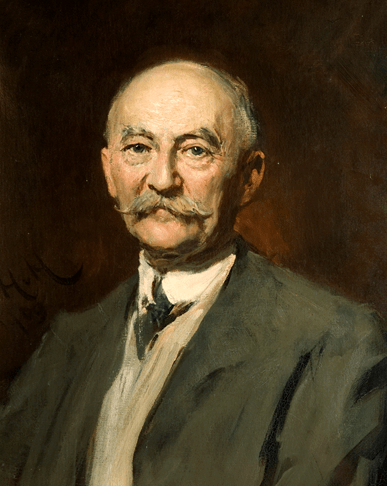Thomas Hardy
“Convergence of the Twain”

Thomas Hardy's poem "Convergence of the Twain" is an alternative perspective on the loss of the "Titanic" in April, 1912. The poem's major ideas concern the vessel, its state, and symbolic significance two years after the collision, and a speculation on how the iceberg came to converge with the ship. Hardy is very interested in affiliating the growth and fate of the iceberg and ship through the deification of nature and time. The first five stanzas of the poem concern the submerged ship itself, while the last six discuss its fate while afloat.
In the first five stanzas, Hardy's descriptions of the Titanic are consistently juxtaposed against the ship's present environment to emphasize the waste of money, technology, and craftsmanship. The furnaces of the ship, which contained "salamandrine fires" (5), now have "Cold currents thrid" (6) through them. Where there was once heat and life driving the engines of the ship, there is now coldness and death. A further juxtaposition within this second stanza is the use of the word "pyre" (4), as it connotes funerals and death, while the use of "salamandrine" insinuates a certain tenacity for life (as salamanders were said to live through fires) that could be associated with the Unsinkable Ship everyone believed the Titanic to be before accident.
Hardy further emphasizes the waste of the ship's magnificence by describing how useless the "opulent mirrors" are to uncomprehending sea-worms that are "grotesque, slimed, dumb, indifferent" (9). The jewels on board the ship, now at the ocean's floor, become "lightless, all their sparkles bleared and black and blind" (12). The poet's use of multiple adjectives and alliteration intensifies the somber nature of these descriptions. The items that Hardy has chosen in his poem to embody the loss of the ship (the cold furnaces, bleared mirrors, and lightless jewels, rather than the loss of life) are indicative of his attitude towards the ship and what it stood for.
The Titanic was not simply a ship built to traverse the ocean; it was a symbol of the wealth, power, and industrialization of Britain during this time. The items which appear in Hardy's poem are representative of the power, wealth and vanity of the British nation. Hardy's discussion of these items, rather than the more glaring issues of death and human suffering normally associated with the loss of the ship, would seem to indicate his disdain for the pride and importance that his contemporaries placed upon scientific and technological progress.
Hardy's discussion of the Titanic shifts in stanza six to address the cause of the disaster. His use of enjambment between the sixth and seventh stanzas seems to be a technique employed to represent not only the coming together of the iceberg and ship in the poem, but also their literal collision. Hardy's use of deification for both nature and time in the last six stanzas contribute to the ominous and fated quality of the Titanic disaster. Hardy suggests that the Titanic converging with the iceberg was not a coincidence, but rather an event planned by an "Immanent Will" (18) and "The Spinner of the Years" (31); inferring the ship had been destined for destruction since its inception. The eighth stanza, perhaps the most ominous of the poem, outlines how the ship and iceberg grew to their completion concurrently, "as the smart ship grew / In shadowy silent distance grew the Iceberg too" (22, 24). Hardy uses words such as "mate" (19), "intimate welding" (27), and "consummation" (33) to emphasize the apparent predestination that these two behemoths seemed to have, and to imply a wedding or sexual union of those mighty opposites.
Although he does not indicate implicitly that he believes in the powers he names, Hardy weaves these deifications into the poem to create a desired effect. The powers are not portrayed as benevolent or merciful as the Christian God would be, but rather they are the cause of this disaster. It would seem that Hardy is telling his audience that humanity, no matter how progressive we may become, will always be at the whim of nature, which has no feeling or care. We are not able to rise above or control a monolith such as the sea regardless of how far our progress has taken us. Knowing the Titanic disaster then, according to Hardy, should be a constant and humbling reminder of humanity's fallibility.
http://www.victorianweb.org/
“Ah, Are You Digging on My Grave”
“Ah, Are You Digging on My Grave,” is a poem written by Thomas Hardy. The central theme of this poem is death, which is also seen in several different forms throughout the works of Thomas Hardy. There is a great deal of disappointment expressed in this poem. The Oxford Reader’s Companion to Hardy deems it, “a satire of circumstance” (Page 378). Thus, death and the afterlife are things of tragedy in this particular work. The point that Hardy makes is that no love or hate outlasts death.
An important aspect to the poem’s structure is that it is written sequentially in order to prepare the reader for an unsettling ending. Hardy takes us on a downward spiral through, as The Pattern of Hardy’s Poetry puts it, a “series of steps from appearance to reality” (Hynes 53). The dead woman believes that someone she loved is there at her grave. This, however, she finds out is untrue through a devastating sequence of disappointments. The woman originally suspects that the person at her grave is her husband, but sadly it is not. In reality, her husband is off with his new love, and feels that since she is dead it, “cannot hurt her now” (p.48; l.5). Consequently, the woman guesses again, thinking this time it is her closest of kin. She is, yet again, disappointed. She finds out that they do not care to think of her anymore. This feeling of neglect is seen in the line, “What good will planting flowers produce?” (p.48; l.10). In other words, the family of the woman would rather not think of her than hurt themselves by doing so. Their reason for not going to see her is that nothing can bring her back from, “Death’s gin” (p.48; l.12). At this point, Hardy has still not revealed the digger’s identity. He continues to do this, according to A Critical Introduction to the Poems of Thomas Hardy, to show that, “the eager hopefulness of the dead woman is mercilessly quenched” (Johnson 138).
Next, we come upon a slightly different subject. In the third stanza, the woman sees now that not only has she been forgotten by her most beloved, but also by her worst enemy. She is told that her enemy, “cares not where you lie” (p.48; l.18). Similarly, as with her loved ones, her enemy simply thinks the woman no more worth her time to worry about.
In the next stanza, the woman has exhausted all of the possibilities, so she gives up and asks who is there. She now finds out that it is her dog. Hardy himself loved animals and it is not a surprise that he would use a dog as the digger. As seen in Victorian Poetry, Hardy, “always championed kindness to animals” (9: 465). He, however, creates a surprising twist, at the end of the poem. Earlier on, in the fifth stanza, the woman praises the noble dog, stating how no human can rival, “A dog’s fidelity” (p.49; l.12). In the last stanza of this rather depressing poem, comes the final blow to the woman. The dog has not remembered her either and has, in fact, mistakenly trodden upon her grave.
In the words of The Pattern of Hardy’s Poetry, the dog believes that her grave is, “a place to bury bones, not affections” (Hynes 53). So, even her faithful dog does not care to remember her.
“Ah, Are You Digging on My Grave,” is a very tragic and sad poem. It is written in Victorian Studies that, “Hardy recognized that personal relations provide no sure refuge from tragic experience” (36: 176). This plainly means that, as far as death is concerned, few are truly remembered, if any, after they are dead and gone. The most important parts of the woman’s life were, indeed, the people that she knew. From her husband and her kin, to her worst enemy and loyal animal friend, the woman finds out little by little that none of them care enough to come to her grave. The dog does, however, come to her grave but only by mistake. It seems as though the woman has not lived on in their memories, rather, everything that she was to them was sealed, like herself, in the grave.
http://studentbounty.com/

 سید شهاب الدین ساداتی
سید شهاب الدین ساداتی